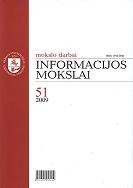KOMUNIKACINĖ MEDITACIJA, ARBA KINAS KAIP FILOSOFINĖ STRUKTŪRA. KINO REŽISIERIAUS A. TARKOVSKIO IR FILOSOFO DELEUZE'O SANKIRTA.
COMMUNICATIONAL MEDITATION OR CINEMA AS A PHILOSOPHICAL STRUCTURE. CONFRONTATION BETWEEN A FILM DIRECTOR (TARKOVSKY) AND A PHILOSOPHER (DELEUZE)
Author(s): Andrius GudauskasSubject(s): Education
Published by: Vilniaus Universiteto Leidykla
Keywords: cinematic plan; cinema montage communication; philosophy of cinema; real time, abstract time; image-mouvement; image-temps; planséquence, duration (durée); pressing of time.
Summary/Abstract: The modern mass media are trying to take an active part in the philosophical scientific discourse. In this context, philosopher Gilles Deleuze makes a special emphasis on the role of films, because contemporary cinema directors are truly resolute in building bridges between cinema as an art and philosophy. Due to cinematic technologies, philosophical questions of new importance are being raised in modern cinema. the essential philosophical idea found in Tarkovsky’s films is the fundamental idea of eternal time. This article discusses the problem of representing cinematic time and its flow in relationship with Deleuze’s philosophical theory of cinema as well as with the general philosophy of communication. Tarkovsky’s cinematic thought evolves while creating a certain kind of opposotion to Eizenstein’s dialectically materealistic theory of cinema. Installing the true and continuous flow of time in a long plan-séquence, Tarkovsky opposes his practical and theoretical conception which reduces cinematic time to the factological and mechanistic rhythm alone. thus, his prolonged separate planes destroy the rational classical structure of the film and introduces an “irrational break” into it. We analyze the ways how separate long plansequences liberated from their rational mutual ties, can present in the course of continuos flow of time the ontological and convergent links between such pieces of temporality as past reminiscences and dreams.
Journal: Informacijos mokslai
- Issue Year: 2009
- Issue No: 51
- Page Range: 9-23
- Page Count: 15
- Language: Lithuanian

